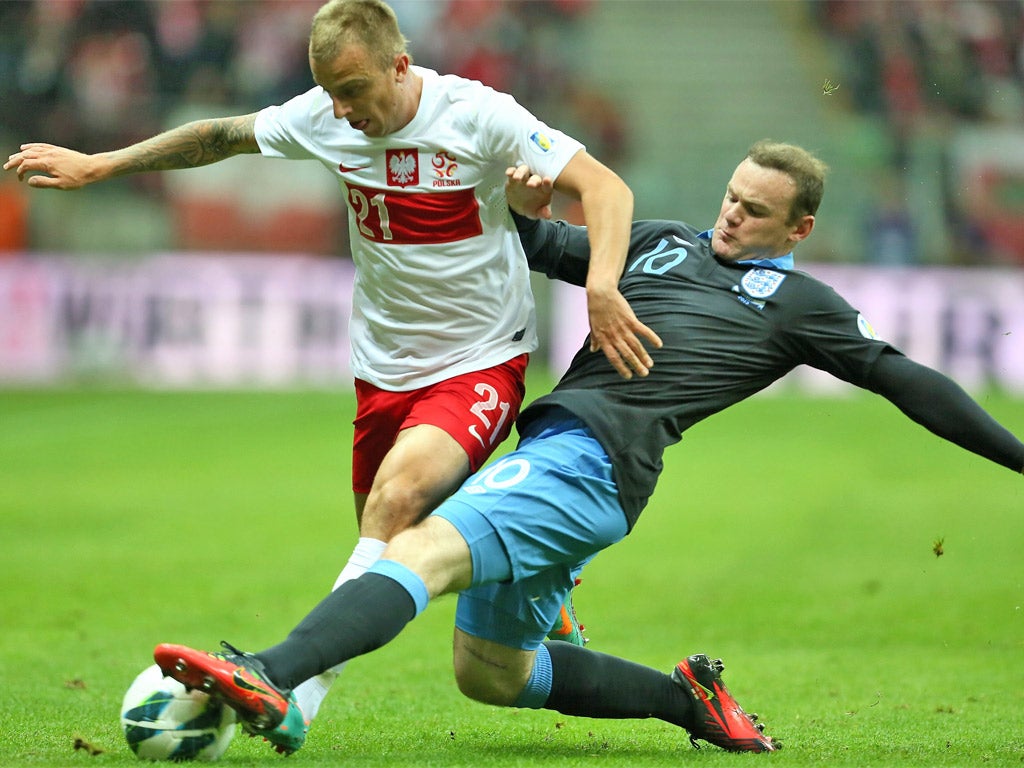Glenn Moore: Wayne Rooney looked hungry and ran hard but he failed the challenge of reinvention
Striker was asked to adapt and improve but, like his team-mates, he was not up to the task

This was not an England performance that should have been broadcast before the watershed. Nor before it was decent to reach for a stiff drink. If the DVD ever gets shown at St George's Park it will be as a cautionary tale. Then it will be tossed into a large box along with so many other palsied displays down the years by a national side that continues to disappoint.
"A decent point," was Steven Gerrard's immediate reaction. While winning away is never easy in international football (unless playing in San Marino, Moldova etc) England should have won this game. Roy Hodgson's team featured four players who have won the Champions League against a Polish one shorn of their captain and with a bare handful of players regularly involved in major European leagues.
Instead it was as if England had spent the previous night watching re-runs on Polish television of the seismic shock of 1973, when Jan Tomaszweski's heroics meant England failed to qualify for a World Cup finals for the first time. For any Englishman of a certain age and above the realisation that the day's delay meant this match was played on the anniversary of that game sent a shiver down the spine. That qualifying programme was the end of an era, ushering Sir Alf Ramsey and Bobby Moore off the international stage and England into a long period of introspection.
Yet this team are far too young to remember that. They, like their opponents, have grown up with England dominating the Poles, winning nine and drawing four of 13 meetings, all competitive, since Gary Lineker's hat-trick at Mexico '86. Which made England's nervous first half perplexing. England have superior players and the game was played in the capital's beautiful, modern, National Stadium – a far cry from the grim Silesian coalfield venues England used to be sent to, or even the decrepit old Warsaw arena in which David Batty was dismissed as fans fought on the terracing in 1999. The atmosphere was described as electric, but it was not intimidating. What the Under-21s experienced in Serbia the previous night was intimidating. True, the going was soft underfoot, but England should still have expected not just to avoid defeat, but to win.
When Hodgson took over amid chaos in May, being hard to beat was his priority, which has long been a virtue of his teams. Having achieved that, he is seeking to evolve his England XI into one which is more oriented towards winning matches. The rigid 4-4-2 has been replaced by a more fluid 4-2-3-1. Moreover, in line with recent tactical developments, the midfield anchors are not holding players in the mould of Batty or Scott Parker, players who win the ball and give it to someone nearby who can pass it, but all-rounders capable of starting moves as well as breaking them up. As yesterday underlined, Michael Carrick is no Andrea Pirlo, but he is a similar player, theoretically able to dictate play from deep. Alongside him was Gerrard, once a box-to-box, flank-to-flank, action man, determined to influence play everywhere on the pitch but too often drawn out of position as a result. Age and the armband have persuaded Gerrard to play with greater responsibility, as shown at Euro 2012.
This pair should have been able to impose themselves on an opposition still under a cloud, as well as a roof, following their failure to escape the group stage at Euro 2012 despite home advantage. But England never got going. Tom Cleverley looked uncomfortable on the left, Jermain Defoe was isolated in attack, Ashley Cole was overrun by Poland's vibrant right-flank. Even the usually reliable Joe Hart was drawn into error.
After Gary Neville's call to arms on the eve of the match the onus was on Wayne Rooney to deliver. Given his physique, which needs constant training to remain in condition, and an outlook on life which too often seems joyless or needlessly aggressive, one has wondered whether his best days may already be behind him. Neville, who maximised his ability throughout his own career, challenged Rooney to challenge himself. He was hungry enough yesterday, chasing back to tackle in the left-back position, dropping deep to get the ball, looking for space between the lines, but in possession he made little impact. Even his goal seemed slightly fortuitous, and was to a degree overshadowed by his miss when set up by Welbeck. Finally, as England retreated into 4-5-1, he was withdrawn.
The most creditable aspect of England's performance was the way they showed enough composure and character to quell the Polish spirit after the equaliser. But character has rarely been a problem with English footballers: unlike passing to a team-mate, making the right decisions in possession, and attacking with imagination.
Join our commenting forum
Join thought-provoking conversations, follow other Independent readers and see their replies
Comments